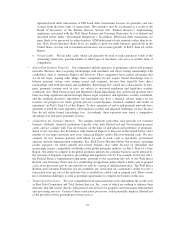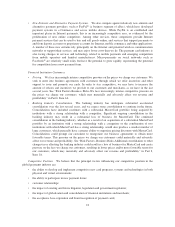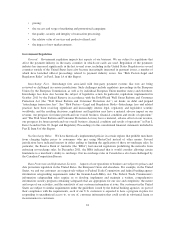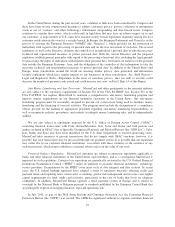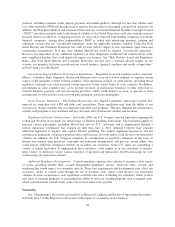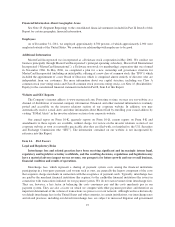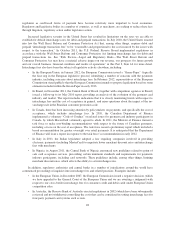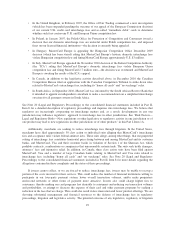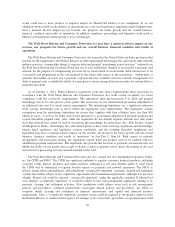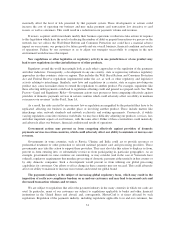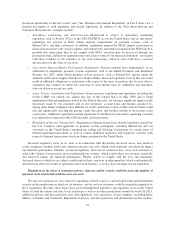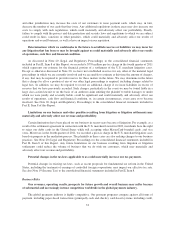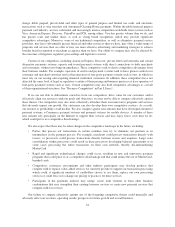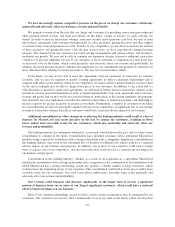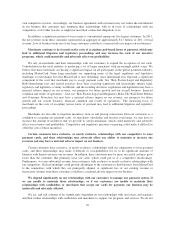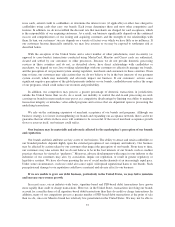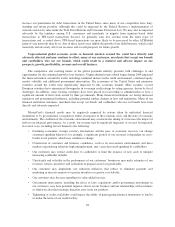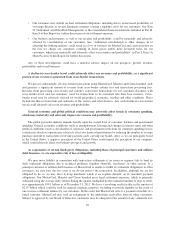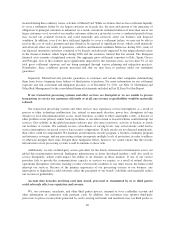MasterCard 2011 Annual Report Download - page 34
Download and view the complete annual report
Please find page 34 of the 2011 MasterCard annual report below. You can navigate through the pages in the report by either clicking on the pages listed below, or by using the keyword search tool below to find specific information within the annual report.action could have a more positive or negative impact on MasterCard relative to its competitors. If we are
ultimately unsuccessful in our defense of interchange fees, any such legislation, regulation and/or litigation may
have a material adverse impact on our revenue, our prospects for future growth and our overall business,
financial condition and results of operations. In addition, regulatory proceedings and litigation could result in
MasterCard being fined and/or having to pay civil damages.
The Wall Street Reform and Consumer Protection Act may have a material adverse impact on our
revenue, our prospects for future growth and our overall business, financial condition and results of
operations.
The Wall Street Reform and Consumer Protection Act enacted in the United States includes provisions that
provide for the regulation by the Federal Reserve of debit and prepaid interchange fees and certain other network
industry practices. Among other things, it requires debit and prepaid “interchange transaction fees” (referred to in
the Wall Street Reform and Consumer Protection Act as fees established, charged or received by a payment card
network for the purpose of compensating an issuer for its involvement in an electronic debit transaction) to be
“reasonable and proportional to the cost incurred by the issuer with respect to the transaction.” Additionally, it
provides that neither an issuer nor a payment card network may establish exclusive network arrangements for
debit or prepaid cards or inhibit the ability of a merchant to choose among different networks for routing debit or
prepaid transactions.
As of October 1, 2011, Federal Reserve regulations went into effect implementing these provisions in
accordance with the Wall Street Reform and Consumer Protection Act (with certain exceptions for issuer
compliance with the exclusivity requirements). The regulations limit per-transaction U.S. debit and prepaid
interchange fees to 21 cents plus five basis points. The issuer may receive interim fraud prevention adjustment of
an additional one cent if it meets certain requirements. The interchange limitations are a significant reduction
from average interchange fees in effect before the regulations were implemented. The regulations contain
exemptions from the interchange limitations for issuers that, together with their affiliates, have less than $10
billion in assets, as well as for debit cards issued pursuant to a government-administered payment program and
certain reloadable prepaid cards. Also, while the regulations do not directly regulate network fees, they make
clear that network fees cannot be used to circumvent the interchange fee restrictions. See “Risk Factors—Legal
and Regulatory Risks—Interchange fees and related practices have been receiving significant and increasingly
intense legal, regulatory and legislative scrutiny worldwide, and the resulting decisions, regulations and
legislation may have a material adverse impact on our revenue, our prospects for future growth and our overall
business, financial condition and results of operations” in this Part I, Item 1A. With respect to network
arrangements and transaction routing, the regulations require debit and prepaid cards to be enabled with two
unaffiliated payment card networks. The regulations also provide that an issuer or payment card network may not
inhibit the ability of any person that accepts or honors a debit or prepaid card to direct the routing of the card
transaction for processing over any network enabled on the card.
The Wall Street Reform and Consumer Protection Act also created two new independent regulatory bodies
in - the CFPB and FSOC. The CFPB has significant authority to regulate consumer financial products, including
consumer credit, deposit, payment, and similar products, although it is not clear whether and/or to what extent
the CFPB will be authorized to regulate broader aspects of payment card network operations. The FSOC is
tasked, among other responsibilities, with identifying “systemically important” payment, clearing and settlement
systems that will be subject to new regulation, supervision and examination requirements, although it is not clear
whether MasterCard would be deemed “systemically important” under the applicable standard. If MasterCard
were deemed “systemically important,” it would be subject to new risk management regulations relating to its
payment, clearing, and settlement activities. New regulations could address areas such as risk management
policies and procedures; collateral requirements; participant default policies and procedures; the ability to
complete timely clearing and settlement of financial transactions; and capital and financial resource
requirements. Also, a “systemically important” payment system could be required to obtain prior approval from
the Federal Reserve or another federal agency for changes to its system rules, procedures or operations that could
30




